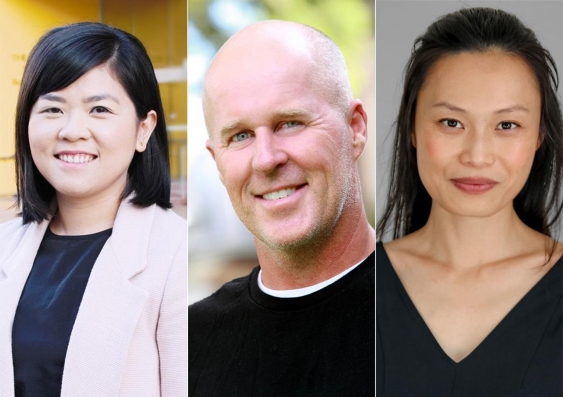Three ≤››ģ ”∆Ķ scientists honoured by Australian Academy of Science
2025-04-08T08:00:00+10:00

Dr Ira Deveson, Professor Katherine Moseby and Associate Professor Anita Liebenau are among Australia’s top scientists celebrated by the Australian Academy of Science.
Photo: ≤››ģ ”∆Ķ
Professor Katherine Moseby’s research has led to the reintroduction of threatened species in outback Australia, Dr Ira Deveson has helped improve the diagnosis of genetic disease and Associate Professor Anita Liebenau is a leading expert in graph theory.
Three ≤››ģ ”∆Ķ researchers have today been recognised by the Australian Academy of Science (AAS) for their outstanding research in conservation biology, human genetics and mathematics.
Professor Katherine Moseby, Dr Ira Deveson and Associate Professor Anita Liebenau are among 22 of Australia’s top scientists to be celebrated by the country’s most prestigious scientific organisation with honorific awards.
≤››ģ ”∆Ķ Dean of Science Professor Sven Rogge and ≤››ģ ”∆Ķ Dean of Medicine & Health Professor Cheryl Jones congratulated the academics.
‚ÄúWe are very proud of them, and their success points to the strength and depth of research at ≤››ģ ”∆Ķ,‚ÄĚ Prof. Rogge said.
‚ÄúKatherine‚Äôs work has helped save some of Australia‚Äôs most endangered species by rewilding them using innovative conservation techniques. Anita‚Äôs research into complex mathematical systems has meanwhile established her as an emerging international leader in the field of graph theory, leading to developments in network and algorithm design and epidemiology,‚ÄĚ he said.
‚ÄúTheir research is addressing some of society‚Äôs biggest challenges and also changing the world for the better.‚ÄĚ
Prof. Jones said Dr Deveson’s work on genetic variations had significantly improved our understanding and diagnosis of inherited disease.
‚ÄúGenomics has immense potential to transform health care and Dr Deveson‚Äôs research has far reaching impacts. Most importantly, it provides a lot of hope to those diagnosed with rare and complex genetic conditions,‚ÄĚ she said.
Professor Katherine Moseby
Prof. Moseby, from the Centre for Ecosystem Science, is a wildlife ecologist who specialises in the reintroduction of threatened mammals and the interactions between introduced predators and native prey.
She was awarded the Fenner Medal for her research, which has improved conservation outcomes for Australia’s unique fauna and flora, including bilbies, quolls, bandicoots, numbats and woma pythons.
Prof. Moseby has co-founded four conservation partnerships that combine research with practical on ground management, mentoring students in large scale field experiments, and trialling innovative conservation methods.
She said the most significant impact of her research has been helping to demonstrate that fenced safe havens can be a useful tool for re-establishing threatened species back into Australia’s deserts.
‚ÄúThree of the safe havens I co-founded now support over 15 populations of reintroduced threatened species. I also co-designed and tested a feral proof fence that excludes cats, foxes and rabbits which is now used in safe havens around Australia,‚ÄĚ Prof. Moseby said.
‚ÄúMy research has focused on getting threatened species beyond fences and restoration habitats by managing predation and grazing pressure. More importantly, I‚Äôve also helped develop and improve conservation tools for arid zone ecosystems and understand how threatened species can be used to improve the health of ecosystems.‚ÄĚ
Prof. Moseby said she felt very humbled receiving the AAS award.
‚ÄúConservation biology is a team effort, so this award really reflects the incredible work of an amazing team of people. Thanks so much to all those passionate collaborators, volunteers, students and colleagues,‚ÄĚ she said.
Associate Professor Anita Liebenau
A/Prof. Liebenau from ≤››ģ ”∆Ķ Science‚Äôs School of Mathematics & Statistics was awarded the Christopher Heyde Medal. The award honours outstanding research in the mathematical sciences by researchers up to 10 years post-PhD.¬†¬†¬†¬†¬†¬†¬†¬†¬†¬†¬†¬†¬†¬†¬†¬†¬†¬†¬†¬†
The mathematician has made a significant contribution to graph theory, including co-finding a formula that solved a 30-year-old conjecture.
A/Prof. Liebenau said she was honoured to receive the award.
‚ÄúMy hope is that it gets people interested in my area of extremal and probabilistic combinatorics, and that this ultimately strengthens the field here in Australia,‚ÄĚ she said.
A/Prof. Liebenau said her work was motivated by a desire to understand the underlying principles of her mathematical field of study ‚Äď large discrete structures and their behaviours.
‚ÄúWhile results in pure mathematics may not always have immediate practical applications, some of my work, and work on extremal and probabilistic graph theory more generally, often connects to applications in fields like network design, optimisation, algorithm design and epidemiology,‚ÄĚ she said.
Dr Ira Deveson
Dr Deveson from The Garvan Institute of Medical Research and Conjoint Lecturer at ≤››ģ ”∆Ķ Medicine & Health was awarded the Ruth Stephens Gani Medal for his work using new genomic technologies to improve the diagnosis of genetic disease.
His work spans from basic computational methods development to large-scale genomic analysis of diverse cohorts in health and disease. His goals are to develop, adopt, optimise and validate new techniques that may shed new light on the genome, show how these can be used to address unsolved challenges in genomic medicine and facilitate their eventual translation into clinical practice.
Dr Deveson’s team has led the adoption of new technologies for long-read DNA sequencing (LRS) in Australia, allowing researchers to resolve the most complex, repetitive regions of the human genome for the first time, and to reliably identify new classes of genetic variation that are difficult to identify with existing technologies.
By generating a more complete snapshot of a patient’s genome, his team is applying LRS to improve our understanding and diagnosis of inherited disease.
‚ÄúI‚Äôm honoured to receive this recognition for our team‚Äôs work with genomic technologies,‚ÄĚ Dr Deveson said.
‚ÄúWe‚Äôre in an exciting era where advances in long-read sequencing are opening new possibilities for diagnosing, understanding and treating genetic diseases. Our focus is on developing the tools and approaches that can make these advances more accessible and useful in clinical practice.‚ÄĚ
The presents its annual medals to recognise scientific excellence by researchers from the early stages of their careers to those who have made lifelong achievements.
Media enquiries
For enquiries about this story, please contact Stefanie Menezes.
Tel: +61 2 9065 3225
Email: s.menezes@unsw.edu.au








